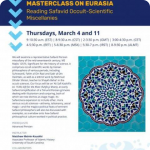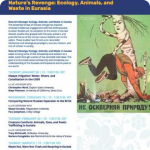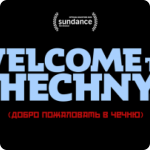Past Events

- Zoom
Join the Center for Russian, East European & Eurasian Studies with our UCIS colleagues as we discuss international variations on one of our favorite drinks. REGISTER: https://pitt.zoom.us/meeting/register/tJEscu2przwpHd1fqozi_jcrRGLWTsDDASgC

- Prof. Dr. Julia Obertreis, Friedrich-Alexander Universität, Erlangen-Nürnberg
- Zoom

- Dr. Julia Obertreis, Friedrich-Alexander Universität, Erlangen-Nürnberg
- Zoom
Studying water infrastructure is an excellent entry point to examine the nexus between the utilization of natural resources and technologies on the one hand, and of politics and everyday life on the other. The talk will first address important findings of a study on irrigation systems and cotton cultivation in Central Asia. Here, the Russian colonizers of the nineteenth century implemented ideas of modernity and transformation that lived on in the Soviet context. Second, the talk presents the outlines of an ongoing project on water on public display, comparing the relevance of artificial lakes, fountains, and drinking wells in cities like Berlin and Tashkent. Both cases combine cultural studies‘ approaches with the history of infrastructure and technology.
Julia Obertreis is Professor for Eastern European modern history at the University of Erlangen-Nürnberg, Germany. In her teaching and research, she focuses on water infrastructures in the Soviet Union in a global perspective. She has an interest in the Soviet Union as a multiethnic empire and in oral history as a critical method in Eastern European history. Her first book is Living in Leningrad Between Everyday Life and Utopia, 1917-1937 (Böhlau Verlag, 2004). Her second book is titled Imperial Desert Dreams. Cotton Growing and Irrigation in Central Asia, 1860–1991.
REGISTER HERE: https://pitt.zoom.us/webinar/register/WN_O8xyvhLYTBazBGIUjjeIwQ?fbclid=I...

After a botched attempt to poison Alexei Navalny in August 2020, the Kremlin has decided to sentence him to over two years in prison upon the oppositionist’s return to Russia in January. Navalny responded with a bombshell video about the corruption around “Putin’s Palace.” Unsanctioned, mass protests filled the two capitals and tens of provincial cities resulted. The protesters were met with mass, indiscriminate arrests, and police violence. The political ante in this back-and-forth has certainly risen but to what end? Russia has experienced the ebbs and flows of protest on the federal and local level for years. And while each eruption quickly elicits a sense that Russia is at a turning point, more cautious and sober assessments follow in the weeks and months after. So, is what we’re now seeing something new or more of the same? What do the protests suggest about Russian society, politics, and the state of Putin’s power? Especially, as Russia will hold parliamentary elections in September. This live roundtable discussion with Greg Yudin (Moscow School of Social and Economic Sciences), Svetlana Yerpyleva (Public Sociology Laboratory), and Ilya Budraitskis (Moscow School of Social and Economic Sciences and Political Diary Podcast) and moderated by Sean Guillory (REEES and the SRB Podcast) will explore these issues and more. REGISTER HERE:https://pitt.zoom.us/meeting/register/tJckdOyrrjkoGtwStsGw09Vq-k7hJOmUeLKv

- Matthew Melvin-Koushki, University of South Carolina
- Zoom
We will examine a representative Safavid Persian miscellany of the mid-seventeenth century, MS Majlis 12575. Significant for the history of science, it comprises occult-scientific works by Iranian philosophers of various periods, including Suhravardi, Fakhr al-Din Razi and Sadr al-Din Dashtaki, as well as a lettrist work by Mahmud Dihdar Shirazi, teacher to Shaykh Baha'i in the occult sciences. Our focus will be on 'Ali Safi Kashifi's (d. 1535) Gift for the Khan (Tuhfa-yi khani), an early Safavid simplification of a Timurid Persian grimoire dealing with illusionism and conjuring, both of which we now dismiss as stage magic. Its Safavid-era expansion to include other, more serious occult sciences? alchemy, talismanry, astral magic? and the magico-political feats of eminent
Safavid philosophers will also be discussed with examples, as a window onto how Safavid philosophical culture worked in political practice.
PLEASE NOTE that registrations are limited and will be confirmed on a first-come, first-serve basis for Ph.D. students and faculty who work on Eurasia and can meet the language prerequisites specific to each topic.
PREREQUISITE
Advanced Persian
INSTRUCTOR
Matthew Melvin-Koushki
Associate Professor of Islamic History
University of South Carolina
COLLABORATORS
Aziza Shanazarova
UCIS Postdoctoral Fellow of REEES
University of Pittsburgh
REGISTER HERE: https://pitt.zoom.us/meeting/register/tJYofuyhrTwjEtS-vEx0Wu98a9kr5_SMb9ry

- Elana Resnick and Viktor Pal
- Zoom
A live interview with Elana Resnick (University of California, Santa Barbara) and Viktor Pal (University of Helsinki). Register via Zoom here: https://pitt.zoom.us/meeting/register/tJIsc-GtrDwqHtAFNYiaO2HUNQNc5_tI2B-m The existential threat of climate change has inspired renewed intellectual engagement with the Anthropocene. Eurasian Studies are no exception to this trend. In the last decade, studies that grapple with the past, present, and potential future of the human-nature dialectic are on the uptick. These studies have forced us to reconsider intellectual and ideological paradigms, sources, mission, and role of scholar in society. Nature’s Revenge: Ecology, Animals, and Waste in Eurasia seeks to bring some of this scholarship and activism to a wider public through a series of live-recorded interviews. The goal is to illuminate recent scholarship and complicate our understanding of the Eurasian Anthropocene and its place in our world.

In recent years, the EU has adopted far-reaching legislation and policies to support LGBTIQ and women’s rights across a broad range of issues from the gender pay-gap through accession to the Istanbul Convention on violence against women to gender equality in culture and foreign affairs, biodiversity, and digital policy. Yet, several member states have resisted such transnational efforts and have not only removed the word “gender” from official documents and eliminated the field of gender studies in higher education but also rolled back gender rights within their boundaries, sparking sustained protests most notably in Poland and Hungary.
Join us for this interdisciplinary panel of scholars, policy-makers, activists, and politicians to explore the history and the future of gender equality in the EU.
Moderator:
Müge Kökt en Finkel
Assistant Professor, GSPIA
University of Pittsburgh
Speakers:
Laura Albu
Vice President, European Women's Lobby
Lenka Bustikova
Associate Professor, Political Science
Arizona State University
Malgorzata Fidelis
Associate Professor, History
University of Illinois, Chicago
Alice Kuhnke
MEP, European Parliament
Vice Chair, Group of Greens/European Free Alliance
REGISTER HERE: https://pitt.zoom.us/webinar/register/WN_d25lT5TKTwSUN_sbWMXxiw

- Zoom
REGISTER HERE: https://pitt.zoom.us/webinar/register/WN_mC41a81tQVONz4oWoRt2Ig
In September 2020, Azerbaijan’s military advanced into the disputed territory of Nagorno-Karabakh and, by November, the Armenian side lost control not only of parts of the disputed territory but also of the security zone seized during the First Karabakh War in 1992-1994. Join us for a forum to explore the history and human cost of this war, the impact of Russian and Turkish rivalry in the region, and the prospects for long-term peace.
Moderator:
Vasili Rukhadze, Lecturer, Political Science, University of Pittsburgh
Speakers:
Gerard Libaridian, Professor Emeritus, History, University of Michigan
Zaur Shiriyev, Analyst for the South Caucasus, Crisis Group
Thomas de Waal, Senior Fellow, Carnegie Europe
Fatma Müge Göçek, Professor, Sociology, University of Michigan
Joshua Kucera, Turkey/Caucasus Editor, EurasiaNet

- Vimeo
From Academy Award-nominated director David France ("How to Survive a Plague," "The Death and Life of Marsha P. Johnson") comes "Welcome to Chechnya," a powerful and eye-opening documentary about a group of activists risking their lives to confront the ongoing anti-LGBTQ persecution in the repressive and closed Russian republic of Chechnya. With unfettered access and a commitment to protecting anonymity, this documentary exposes Chechnya's underrepresented atrocities while highlighting a group of people who are confronting brutality head-on. The film follows these LGBTQ+ activists as they work undercover to rescue victims and provide them with safe houses and visa assistance to escape persecution. "Welcome to Chechnya" is a Public Square Films production, directed by David France and produced by Alice Henty, Joy A. Tomchin, Askold Kurov, and David France.
This documentary has received numerous international awards, including at the 2020 Sundance Film Festival and the Berlinale.
Moderator: Nancy Condee, Director, Center for Russian, East European, and Eurasian Studies, Director of Graduate Studies, Slavic Languages and Literatures
Speakers: David France, Director, "Welcome to Chechnya"
Frank Karioris, Lecturer, Gender, Sexuality, and Women's Studies Program
https://www.welcometochechnya.com
REGISTER TO ATTEND HERE: https://tinyurl.com/y2la43za

- Ryan Stannard
- Zoom Discussion
UCIS International Career Toolkit Series Presents:Peace Corps 60th Anniversary Alumni Panel
Discover the benefits of Peace Corps service from generations of returned Volunteers. Join us during Peace Corps 60th Anniversary Week to learn about the challenging, rewarding and inspirational moments from a panel of returned Peace Corps Volunteers. Ask questions about service and gain tips to guide you through the application process. Narrated by Regional Recruiter, Ryan Stannard. Please note this event will be held online rather than in-person. Please register in order to gain access to the event.
Register:
https://www.peacecorps.gov/events/21_vrs_paneldiscussion_pittpcweek_2021...

- Alyson Kavalukas
- Zoom Discussion
Mastering LinkedIn for Future Global Affairs Careers
Wednesday, March 3rd, 3:30-4:15pm
Alyson Kavalukas joins us from Career Services to discuss successful generation of a LinkedIn account in seeking positions, learning from professionals and alumni, and increasing networking potential in global affairs. Question and Answer session to follow.
Register:
https://pitt.zoom.us/meeting/register/tJMldemprT4uGNGoE4BN_XfFP4nPb0mGEDi5

- Zoom
Grab a drink and connect, with old friends and current students. While each year we typically enjoy hosting an alumni/student networking reception in Washington DC, this year we have a unique opportunity to extend this networking event beyond DC metropolitan area! After some brief introductions, we’ll break out into two sequential small break-out rooms for more personal engagement -- based on interest and location. We hope you can drop in and say hello. Registration link: https://docs.google.com/forms/d/e/1FAIpQLSfp6bBpmlQ0xYHwFMHufmDrz5O5f_RS...

- Zoom
While the Black Lives Matter Movement has revived global conversations about racism and systemic inequality, its reception in our region manifested not only in anti-racist solidarity protests but also in pro-nationalist activism, most notably in Russia. Join us to discuss whether the Black Lives Matter movement will have a lasting impact on the struggle against racism and for civil rights and social equality in our region.
2:00-3:30 pm (ET) | 1:00-2:30 pm (CT) | 12:00-1:30 (MT) | 11:00 am-12:30 pm (PT)
MODERATOR:
Sibelan Forrester, Swarthmore College
SPEAKERS:
Angéla Kóczé, Central European University
Diana Kudaibergenova, University of Cambridge
Maxim Matusevich, Seton Hall University
Jakobi Williams, Indiana University, Bloomington
This event will be recorded and streamed live on the ASEEES Facebook page (https://www.facebook.com/slavic.e.european.eurasian.studies/)
REGISTER IN ADVANCE: https://www.ucis.pitt.edu/creees/race-in-focus
This event is part of the series "Race in Focus: From Critical Pedagogies to Research Practice and Public Engagement in Slavic, East European, and Eurasian Studies." This series is designed to elevate conversations about teaching on race and continued disparities in our field while also bringing scholars from underrepresented minorities and/or research on communities of color to the center stage.

- Zoom
Speaker: Alum Katie Sives, '18 GSPIA/GSPH formerly served as Policy Fellow with Association of Schools and Programs of Public Health (ASPPH) at the Centers for Disease Control and Prevention (CDC), National Center for Chronic Disease Prevention. She assumed a new position at CDC working with COVID-19 response. To register: https://pitt.zoom.us/meeting/register/tJctd-iurjstHNUCcNNYepvQz2zsFGvh4ALp Visit: https://www.ucis.pitt.edu/global/career-week

- Zoom
Speaker: Roy A. Savoy (Executive Liaison Support Officer, NSEP) will discuss international career and scholarship opportunities at the Department of Defense, such as the Boren Fellowship, the Critical Language Scholarship, and the Presidential Management Fellowship. Register in advance for this meeting: https://pitt.zoom.us/meeting/register/tJUoceuoqzkuH93jDekJQmkdGHUgX14QaCBz Visit: https://www.ucis.pitt.edu/global/career-week
- ‹ previous
- 44 of 46
- next ›
